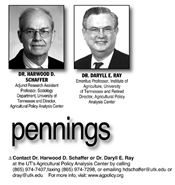|
Farm And Nutrition Programs Belong Together

As promised in out previous column, this week we are going to talk about philosophical issues as they relate to food and agriculture. We will discuss philosophy and economic theory in the next column.
In writing this column, we understand the reaction of readers whose eyes begin to glaze over at the mention of the word philosophy because they are expecting some gibberish that they don’t understand.
For us it is not complicated and does not involve long words that need to be looked up in the dictionary. It is as simple as saying that from humanitarian and religious perspectives it is unacceptable to allow people to die of hunger or suffer from malnutrition and stunting as the result of not being able to gain access to a stable, nutritious, culturally appropriate diet.
Various philosophers and theologians may take different routes to come to that conclusion. But in the end, it is as simple as recognizing that in a world where we can produce and maintain a surplus of food, hunger is not an acceptable outcome.
In the US, in the last year we have read or heard news stories accompanied with pictures of queues of long lines of cars making their way to a place where volunteers hand a box full of groceries through an open car window to people who have never before needed a handout. The result of the pandemic and subsequent loss of a job has left them with few options to provide food for their families.
Time and again we have relied on volunteer efforts like those to provide food for the hungry. And in emergency situations, that is the quickest way to meet the need for food, but for the longer term we need a more systematic program.
The International Covenant on Economic, Social, and Cultural Rights (tinyurl.com/4yu2b7mh) which has been signed by 170 countries (but not the US) codifies the responsibility of all countries to Respect, Protect, and Fulfil the right of all people to a stable, nutritious, and culturally appropriate supply of food.
We realize that there are people who worry about protecting the system against grifters when we talk about food as a human right. And there certainly are some grifters who take advantage of feeding programs as a means of avoiding work. But there are grifters at the top of the economic scale as well.
Dealing with grifters all along the economic scale is a distinct issue from ensuring that no one dies of malnutrition or suffers from diseases and conditions related to related to nutritional deficiency.
In recent years, we have seen efforts to split the farm bill, separating farm programs from nutrition programs including the Supplemental Nutrition Assistance Program, commonly referred to as food stamps. While the expressed rationale is often couched in terms of differences between the programs, it is clear that the real goal is to weaken the support for both programs by delinking one that is related to rural areas from one that is perceived to have an urban focus.
We would argue that if it is unacceptable to allow people to die of hunger or suffer from malnutrition and stunting and it is important to maintain the ability to produce and store food in quantities exceeding current needs, then the two programs are inextricably linked.
From our perspective it is philosophically important the keep two programs in the same piece of legislation. Without the need for food there is little rationale for the government to be involved in agriculture and without an adequate supply of food there is no way to provide people with an adequate diet.
The farm bill needs to ensure that enough food is produced to feed the domestic population while meeting industrial and export needs. At the same time, the farm bill needs to include policies to maintain reserves that ensure a long-term stable supply of foodstuffs. In addition, it is important to make sure that there are mechanisms in place to ensure that food insecure people have access to food while ensuring that farmers receive prices that cover the full cost of production. ∆
DR. HARWOOD D. SCHAFFER: Adjunct Research Assistant Professor, Sociology Department, University of Tennessee and Director, Agricultural Policy Analysis Center
DR. DARYLL E. RAY: Emeritus Professor, Institute of Agriculture, University of Tennessee and Retired Director, Agricultural Policy Analysis Center
|
|